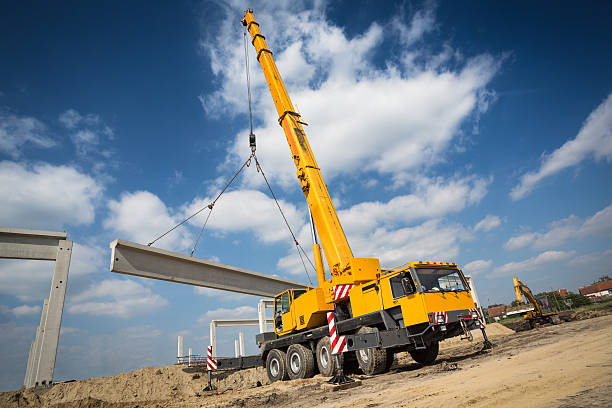
Cranes are one of the most versatile and multi-purpose of the major types of construction equipment. Capable of lifting and moving large weights, they’re deployed in roles ranging from building construction to waste removal to installing air conditioners. There are also numerous types of cranes, each designed for specific roles, and with specific capabilities.
So, it might be tempting for businesses to look into buying their own crane for private use. However, this is rarely a good idea. Aside from dedicated large-scale construction contractors, it is almost always more cost-effective and beneficial to choose crane rentals instead. Rentals bring you the crane services you need, at far less cost than owning and maintaining your cranes.
Why renting cranes is beneficial?
I. The Expense of Owning a Crane
Simply put, cranes are incredibly expensive to own and operate – typically more than the benefit they’d bring as business assets. Even the smallest cranes will be five figures, and that only goes up as the size and strength of the crane does. Industrial-sized cranes can easily run into the millions.
Cranes are also extremely complicated and, due to how dangerous they can be if they fail, maintenance is critical. Cranes must be constantly maintained, with parts serviced and replaced as necessary. There’s also the matter of inspections and licensing, as well as insurance costs. And don’t forget to house the crane, which may need a dedicated structure.
In addition, if you own a crane, you also need operators on staff. This would be a team of several people, including the actual crane operator, the load riggers, and the maintenance staff. Of course, they all need to be licensed, certified, and insured as well.
Then, on top of all of that, one crane will only be suited for a few specific job types. If you required a load larger or heavier than your current crane is rated for, that crane just became useless. As another example, the same is true if you have a road-ready crane with wheels that needs to go offroad where treads are necessary.
This means that there are very few scenarios where a business will have a constant need for a crane, and in a specific narrow set of applications that particular crane is suited. Otherwise, the economics just don’t make sense.
II. The Many Benefits of Crane Rentals
Instead, most businesses simply choose to rent cranes when they’re called for. Even many smaller construction contractors prefer to rent their cranes on a case-by-case basis, rather than trying to maintain their own units.
Here are just a few of the reasons that crane rentals make sense.
1. Vastly lowered costs
The most obvious benefit here is the cost savings. You won’t have to pay for any of the matters listed above, just a single agreed-on price for the crane and operators, for the length of time they’re needed. You aren’t paying for maintenance, licensing, insurance, training, or any of the other long-term costs either.
This may also lead to improved borrowing power since the crane won’t be a liability on your balance sheet.
This can even improve your tax situation. Rental expenses are typically deductible, and they’re also predictable when you partner with a reliable crane rental company. The cost benefits continue when you consider storage and the possibility of having to store the crane in its own building. These costs are substantial, especially when other factors such as property taxes are factored in.
2. The right crane for the right job
Another big reason to rent your crane is that dedicated crane rental companies will maintain a fleet with numerous options in various sizes and capabilities. They can consult with you to understand the job at hand, then rent the perfect crane to fit the situation. This brings the highest chance of success at the job and reduces any chances of accidents or other worksite incidents.
3. Improved logistics
Another service typically provided by crane rental companies is transportation for the crane and dealing with all the challenges associated with that. Larger cranes may need to be towed as oversized loads, and there will be substantial bureaucratic processes attached which smaller companies may have difficulty navigating.
And speaking of navigating, the simple process of moving a crane from one place to another may have numerous challenges of its own, such as working around low-hanging overpasses that the crane could not fit through. Careful planning, surveying, and mapping may be needed before transportation can even begin.
It’s much better to leave these matters to experts.
4. Expert operators
Crane rentals almost always come with a team of operators attached. They’ll be trained on that particular crane and have most likely worked with it extensively on previous jobs. They’ll understand its limitations, proper rigging, and how to best maintain safety while on the job.
Considering that a crane accident can be truly disastrous, the importance of training and safety cannot be overstated. You want the best possible people working on any crane job, and you’ll get them when you rent from a qualified crane supplier.
Bobcat Contracting Helps Build Texas and Oklahoma
When companies need a crane in Texas or Oklahoma, they turn to Bobcat Contracting. We have over thirty years of experience providing cranes across the area, with a particular focus on infrastructure and oil-and-gas work. We maintain a large fleet with options suitable for nearly any job, and we are fanatical about safety. We are proud to have one of the best safety records in the industry – and that means a job done right, the first time.
Contact Bobcat Contracting for a consultation on your next crane job, and a price estimate.
